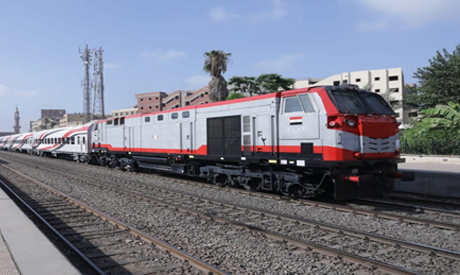
Leapfrogging the transport network
Minister of Transportation Kamel Al-Wazir briefed TV viewers on developments in the sector this week during the inauguration of the third Smart Transportation and Logistics Fair and Forum for the Middle East and Africa (TransMEA) in the capital on Sunday.
TransMEA covers the entire spectrum of the transport and logistics industries in Egypt, whether roads, railways, subways, river transport, or the logistics sector. Inaugurated by President Abdel-Fattah Al-Sisi on the fringes of Cairo’s annual Information and Communication Technology Conference (Cairo ICT 2020), more than 80 exhibitors from 12 countries came to Cairo to display the latest in transport technology.
The fair saw the display of environmentally-friendly gas-fuelled and electric buses and mini-buses manufactured for the first time in Egypt using 45 to 65 per cent local components. There are currently four local companies working on the production of gas-fuelled vehicles in the country, according to Al-Wazir.
The Japanese car manufacturer Toyota signed an agreement with the Arab Organisation for Industrialisation late last year to manufacture 240,000 gas-fuelled minibuses. The Chinese car manufacturer Brilliance is considering a similar agreement.
The ministry is also in negotiations with two other foreign companies, one to manufacture electric buses and the other to produce electric minibuses, Al-Wazir noted.
He said the developments were in line with presidential directions that all the means of transport linking the New Administrative Capital to Cairo should be as up to date as possible and use state-of-the-art technology.
Speaking on the Al-Hekaya talk show on the MBC Masr channel, Al-Wazir said that the development of the sector was not only concentrated on new roads and bridges or new locomotives and buses but also on bringing state-of-the-art technology to safety and even tickets purchases.
The use of artificial intelligence would enable improvements to be made to road networks, and it would reduce accidents and minimise journey times, he said, rationalising transportation costs and fuel consumption. It would also speed up commercial exchanges and control pollution, according to the TransMEA website.
Al-Wazir also announced that after 10 years of negotiations, Egypt had been able to call on local companies in the construction of Cairo’s fourth subway line. Four local companies will work on the first stage, which covers 14km from 6 October City to Haram.
The government has been working on expanding the transportation network in Greater Cairo through new buses, new underground metro lines, the new monorail, and a new electric train line, with many of these facilitating access to the New Administrative Capital set to be inaugurated next year.
Al-Wazir said the ministry had reached an agreement with the French Embassy in Cairo and the French Ministry of Transportation to rehabilitate the Cairo underground’s first line, which has been in use since 1986. The process would cover the railroad, the stations, and the operating systems, he said.
Al-Sisi has approved the start of the renovation process, which is being financed by the European Investment Bank and the European Bank for Reconstruction and Development (EIBRD) through a soft loan with a long grace period.
When asked about current problems with train delays due to manually operated signals, Al-Wazir said the government was working on making all signals and level crossings automatic nationwide.
It had started with three lines totalling 1,300 km from the total of 9,000km of railway lines in Egypt, he said. The lines are the Cairo-Alexandria line, the Banha-Zagazig line, and the Cairo-Aswan line. Each line is being monitored by construction companies like the German company Siemens.
“Work on the signals should end by October or September 2021 in the case of the Zagazig-Banha line,” the minister said. “Work on the Cairo-Alexandria line will end in June 2021.”
*A version of this article appears in print in the 26 November, 2020 edition of Al-Ahram Weekly
Short link: